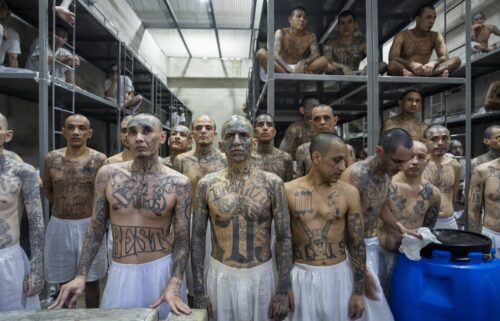Black faith leaders push back after elimination of Sunday voting in one Georgia county

By Simone Pathe and Kelly Mena, CNN
The Rev. Zachary Holmes spent part of last weekend assembling people to head to the polls ahead of Tuesday’s primaries. But the church parking lot was a lot less crowded than it normally would have been.
That’s because it was Saturday, not Sunday.
Previously, Holmes had conducted voting efforts on Sundays after church, as early voting on that day was popular for Black churchgoers. But, amid an ongoing fight over voting access in Georgia and nationwide, the Spalding County election board in April voted to eliminate the option. It is one of seven Georgia counties that had Sunday early voting in the 2020 election but will not have the option available for the midterms.
In a show of resistance against the change in weekend voting options, Holmes, along with other community leaders in the county, held a so-called “Souls to the Polls” event last Saturday.
“We’re doing this mainly because we felt like the Sunday voting issue — it was a success. It got people out to vote and that should be our ultimate goal,” said Holmes, a member of the school board running for reelection in this town of about 23,000 people an hour south of Atlanta.
“No matter what party affiliation you have, we should want to increase participation in the voting process. And that was something that Sunday voting had done,” Holmes said.
Critics of Sunday early voting argue that the option is costly, but Spalding County community leaders don’t buy that argument. They pushed back, arguing the change seemed racially motivated.
“That’s the strongest day for Black people. And I think this is something that is racial, and this is a way to control our numbers at the poll,” said Michael Lawrence, the pastor at Griffin’s Breakthrough Deliverance Church, from which organizers led a convoy of about 12 cars, complete with a police escort, to the local polling location.
Before setting out, a group of about 10 people formed a circle in the sunny church parking lot and bowed their heads in prayer before breaking out into “We Shall Overcome.”
Republicans take over local election boards
In the Peach State, local boards of elections oversee voter registration lists and certifications of elections and decide when voting can take place.
But those elections boards have been restructured under the state’s voting law passed last year. Known as SB 202, the law allows for partisan takeovers of local election boards deemed low performing by state election officials.
The GOP-led legislature also handed control of more election board appointments to conservative local judges or GOP-controlled county commissions in at least five counties — including Spalding — which shifted the balance of power on these boards.
Spalding’s new election board chair, Ben Johnson, was appointed last year by the county commissioner, James Dutton. He had argued against Sunday voting, saying that plenty of other options exist, including mail-in voting and the ability to cast ballots on two Saturdays during Georgia’s 17-day early voting window.
“I still haven’t heard anything that leads me to say that we absolutely have to do it,” Johnson said of Sunday balloting when he voted to eliminate the option in April. “I’ve heard lots of emotional arguments and I sympathize with all of them. Anyone who only has Sunday off — God bless them — but we do have mail-in ballots available.”
The decision by the board to get rid of Sunday voting has brought concerns about voter suppression to the forefront for community members in Spalding.
“It’s clear that Republicans are engaged in an effort to chill the right to vote in this state. It’s so in your face. They’re not even trying to hide it,” said Dexter Wimbish, an attorney who participated in last Saturday’s convoy to a Spalding County polling location.
Wimbish sees Spalding County and the others that have eliminated Sunday voting as “ground zero” for a Republican strategy to hold on to power in a diversifying area.
“You have people who, you know, historically have been able to control the power structure in these communities, and they’re not willing to give up that power without a struggle,” he said.
Backlash against new voting laws
Spalding County is a predominantly Republican area — former President Donald Trump won about 60% of the vote here in 2020. But leaders here pointed out that the top-of-the-ticket results belie the demographics of a town like Griffin, where Black voters are actually the majority of the population; they just haven’t traditionally turned out to vote.
“We’re trying to educate people about why we are going to the polls a little bit at a time,” added Elbert Solomon, co-chair of the Spalding County Voting Project, which helped put on last Saturday’s event. His group has been handing out door-hanging literature complete with a QR code that prompts people to check their voter registration status. “VOTER SUPPRESSION is Alive & Well in Spalding County!” reads the text on another piece of literature. “VOTE ANYWAY!”
In fact, Georgia Republicans’ enactment of restrictive voting laws since the 2020 election have some community leaders believing it may actually make people more motivated to cast a ballot in this year’s midterms.
“Honestly, I used to not care about the vote,” said Jibriel Dubignon, 38. But that changed, he said, when he saw the efforts to limit access to the franchise. “It’s got to be important — they way they’re fighting to take it from us — it has to be; it has to be powerful, otherwise, they wouldn’t be doing everything they’re doing to make sure that we don’t vote.”
Still, voting rights groups have noted a surge this year in early voting, even with the restrictions. Xakota Espinoza, of Fair Fight Action, founded by Democratic gubernatorial candidate Stacey Abrams, told CNN turnout rates for the primary have been high even amid the obstacles.
“Voters are more determined than ever to get out and cast their ballots. But that doesn’t mean they’re not jumping through a number of obstacles, particularly voters who used to rely on Sunday voting, and are no longer able to,” Espinoza said.
As of May 16, more than 380,000 people had early voted in Georgia, according to the Secretary of State. It is nearly three times more than what it was in 2018, when a little more than 120,000 votes were cast.
The rise of voter numbers comes even as Georgia Republicans work to recast voting laws in the state. In the last two years, the state’s GOP-led legislature has passed two major voting bills that activists have said would hurt communities of color. The first, SB 202, created new voter identification requirements for absentee ballots, empowered state officials to take over local elections boards, limited the use of ballot drop boxes and made it a crime to approach voters in line to give them food or water.
This year’s bill created an election police force with the power to investigate election fraud. Both pieces of legislation were signed into law by Republican Gov. Brian Kemp.
“They wouldn’t be expending so much resources and controversy about taking our vote unless there was a reason and it was actually powerful and had the actual power to change some things,” said Dubignon, who’s now helping run his mother’s campaign for state Senate.
Faith leaders in other parts of the Peach State have also pushed back against the new laws by starting grassroots networks in a bid to help voters navigate the election rules.
“We want to make sure that people understand fully what the rules are, and can vote accordingly. And that’s really our focus, we’re sending messages out weekly, just reminding people to check their registration status, to check their polling location,” Rev. Lee May, a former DeKalb County government official and now pastor of Transforming Faith Church, told CNN.
Lee added that voting rights activists are now more motivated to ensure they are turning out voters.
“If somebody tries to take away something from you, you get more defiant,” added Lee.
The-CNN-Wire
™ & © 2022 Cable News Network, Inc., a WarnerMedia Company. All rights reserved.


